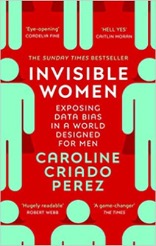Invisible Women by Caroline Criado Perez
A book review by Sarah Phillpott

I found
Invisible Women by Caroline Criado Perez to be a long and wearing read - not because it is dry and academic, but because the gnawing voice which grew louder in my head with every chapter saying, “Yes I know this - so why do you accept it?”
To be a woman in today’s world is to know from birth that I am disadvantaged; judged by different standards. That the expectations placed upon me as a woman are not the same as they would have been were I male. As a woman born and raised in wealthy Northern Europe, my lot is better than it would have been had I been born in the global South but nonetheless I know that I am not so much disadvantaged as unregarded. And this I accept by my complicity with the status quo. What Invisible Women forced me to do is confront this knowledge and my acceptance of it.
I found Criado Perez’s writing style light and easy to read which was a blessing when the subject matter is often weighty. I read this book on kindle and was daunted when it indicated that the book has 411 pages, however 90 of these are end notes because every piece of information that Criado Perez imparts is meticulous, full of detail, example and anecdote and each example has its own footnote.
Criado Perez’s thesis as described in the preface is that most of recorded history is one big data gap. She describes Invisible Women as a story about absence, of silence, of a lack of sex-disaggregated data which not only renders women and their gender-specific lives invisible, tougher and ignored but actively puts them in danger. Divided into six sections, which include Daily Life, Design and Going to the Doctor, the book contains astonishing items such as the lack of statutory requirement to use female specific crash-test dummies, and the information that the indicators for a heart-attack are different in women from men. This on top of data which shows what we should know, that women shoulder more of the burden of caring, working longer hours when unpaid work is included, and are un-regarded when men are planning structures or designing products.
Numbers, technology, algorithms, all of these are critical to the story of Invisible Women says Criado Perez. It was telling me what I knew or suspected already. The challenge for me was to persevere and face her three central themes, the female body, women’s unpaid care burden, and male violence against women, asking myself whether my behaviour had honoured my belief that
in the image of God he created them;
male and female he created them. Genesis 1:27b
This is not a jolly read, but it is a necessary one. Prepare to be challenged - but in that challenge lies the possibility of change.
Invisible Women: Exposing Data Bias in a World Designed for Men
Author: Caroline Criado Perez
Publisher: Vintage (2020)
RRP: £9.99
ISBN: 978 1784 70628 9